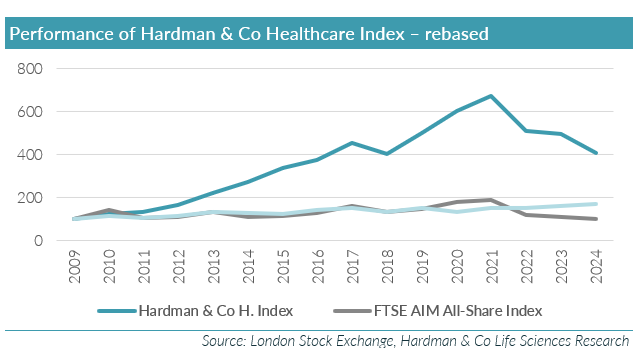2024 – Tough year for Life Sciences
The Hardman & Co Healthcare Index (HHI) has been running since 2009. Its main function is to highlight the attractions of life sciences investments over the long term. For the third year running, despite generally good returns in global markets, particularly in the US, performance in 2024 was poor, not helped by the capital-intensive nature of the sector. The HHI fell 17.7% to 398.9, underperforming all its benchmarks – FTSE 100 (+5.7%), FTSE All-Share (5.6%) and the FTSE AIM All-Share Index (-5.7%). Only 11 companies in our index saw share prices rise in 2024. Despite challenges in raising new capital from the market, 37 UK-listed companies raised £557m last year. Having raised this working capital, we highlight a number of companies looking to generate sales traction from commercial activities in 2025.
- Despite setbacks for the past three years, since inauguration in 2009, the CAGR for the HHI has been 9.8%, compared with 3.5% for the FTSE All-Share Index and 0.1% for the FTSE AIM All-Share Index, highlighting the attractiveness of the healthcare sector as a long-term investment, despite being capital-intensive.
- Of the 53 companies included in the HHI, only 11 recorded an increase in their share prices in 2024. One marked time (change <0.2%) and the remaining 41 companies recorded falls. Shares of all the UK healthcare majors – AstraZeneca (AZN), GSK (GSK), Smith & Nephew (SN.) and Convatec (CTEC) – fell last year.
- The variance between the best- and worst-performing stocks was similar to the level seen historically, at 247% – Allergy Therapeutics (AGY) rising 160% and ValiRx (VAL) down 87%; the median share price change was -14%. Sadly, two companies – AVO and RENE – entered administration, unable to raise capital.
- In relative terms, 28 stocks outperformed the index during 2024, with the other 25 underperforming. Despite the strength of US markets in 2024, the NASDAQ Biotech index also fell (-1.0%) last year, not helped by lower levels of M&A activity and proposed threats to the sector from the new Trump administration.
- Having peaked in 2021, biotech and healthcare stocks have been rerated downwards. In addition, the trend towards greater risk-aversion in response to global tensions, geopolitical events, higher inflation and higher interest rates have made it more difficult to raise capital over the past three years.


